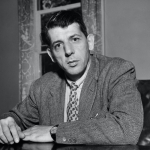And now the heavens shift and the night comes in,
And covers with its darkness earth and sky
And the tricks of the Myrmidons. Throughout the city
The Trojans, wearied by joy, lie fast asleep.
And now the Greeks set out from Tenedos,
Their ships proceeding in an ordered line,
Under the friendly light of the silent moon,
Making their way toward the shore they know so well,
And when the royal galley’s beacon light
Is lighted, Sinon sees it, and quietly goes,
Protected by malign complicit fates,
And furtively opens up the Horse’s flank
And frees the Argive warriors from its womb.
The Horse releases them to the open air
And joyfully they come out: first come the captains
Thessander, and Sthenelus, and dire Ulysses,
Lowering themselves to the ground by means of a rope,
And Acamas and Thoas, and Pyrrhus, Achilles’ son,
And Machaon the prince, and Menelaus,
And Epeus, he, who contrived the Wooden Horse
That fooled us so. And then they enter the city,
That’s deep submerged in wine and unknowing sleep;
They surprise and kill the watch, and open the gates
To welcome in their comrades from the fleet,
Letting them in for what they are going to do.













Comment form: